高中英语语法专题讲解与练习
- 格式:doc
- 大小:52.00 KB
- 文档页数:8
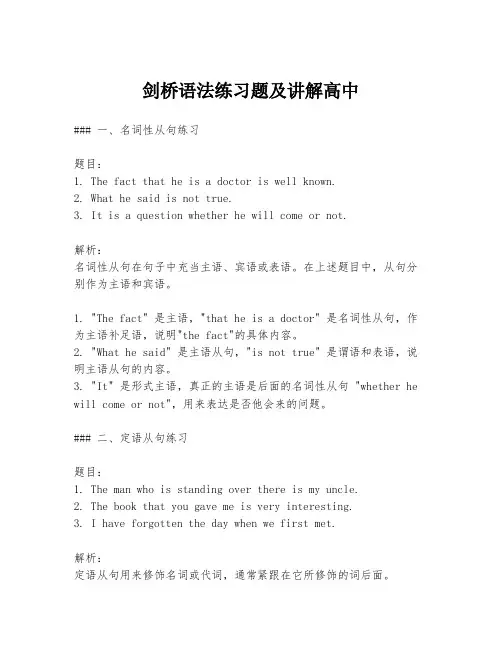
剑桥语法练习题及讲解高中### 一、名词性从句练习题目:1. The fact that he is a doctor is well known.2. What he said is not true.3. It is a question whether he will come or not.解析:名词性从句在句子中充当主语、宾语或表语。
在上述题目中,从句分别作为主语和宾语。
1. "The fact" 是主语,"that he is a doctor" 是名词性从句,作为主语补足语,说明"the fact"的具体内容。
2. "What he said" 是主语从句,"is not true" 是谓语和表语,说明主语从句的内容。
3. "It" 是形式主语,真正的主语是后面的名词性从句 "whether he will come or not",用来表达是否他会来的问题。
### 二、定语从句练习题目:1. The man who is standing over there is my uncle.2. The book that you gave me is very interesting.3. I have forgotten the day when we first met.解析:定语从句用来修饰名词或代词,通常紧跟在它所修饰的词后面。
1. "who is standing over there" 是定语从句,修饰 "The man",说明这个男人的位置。
2. "that you gave me" 是定语从句,修饰 "The book",说明这本书是你给的。
3. "when we first met" 是定语从句,修饰 "the day",说明我们第一次见面的那一天。
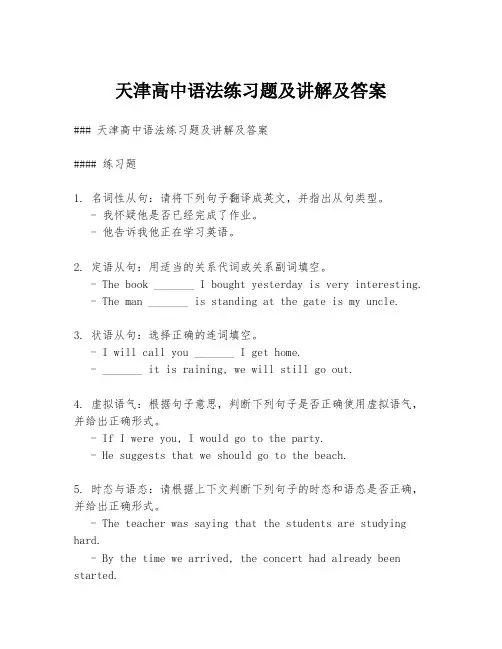
天津高中语法练习题及讲解及答案### 天津高中语法练习题及讲解及答案#### 练习题1. 名词性从句:请将下列句子翻译成英文,并指出从句类型。
- 我怀疑他是否已经完成了作业。
- 他告诉我他正在学习英语。
2. 定语从句:用适当的关系代词或关系副词填空。
- The book _______ I bought yesterday is very interesting. - The man _______ is standing at the gate is my uncle.3. 状语从句:选择正确的连词填空。
- I will call you _______ I get home.- _______ it is raining, we will still go out.4. 虚拟语气:根据句子意思,判断下列句子是否正确使用虚拟语气,并给出正确形式。
- If I were you, I would go to the party.- He suggests that we should go to the beach.5. 时态与语态:请根据上下文判断下列句子的时态和语态是否正确,并给出正确形式。
- The teacher was saying that the students are studying hard.- By the time we arrived, the concert had already been started.6. 非谓语动词:用括号中所给动词的适当形式填空。
- After _______ (finish) his homework, he went out to play. - _______ (see) the beautiful scenery, she couldn’t help_______ (cry).#### 讲解1. 名词性从句:名词性从句在句子中充当名词的角色,包括主语从句、宾语从句、表语从句和同位语从句。
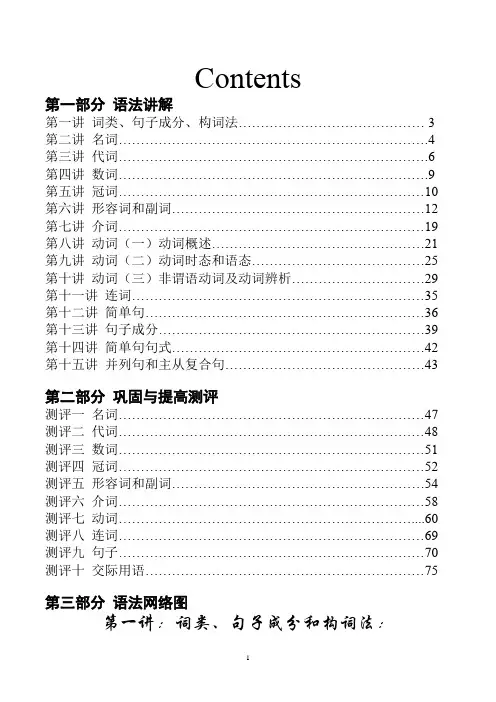
Contents第一部分语法讲解第一讲词类、句子成分、构词法 (3)第二讲名词 (4)第三讲代词 (6)第四讲数词 (9)第五讲冠词 (10)第六讲形容词和副词 (12)第七讲介词 (19)第八讲动词(一)动词概述 (21)第九讲动词(二)动词时态和语态 (25)第十讲动词(三)非谓语动词及动词辨析 (29)第十一讲连词 (35)第十二讲简单句 (36)第十三讲句子成分 (39)第十四讲简单句句式 (42)第十五讲并列句和主从复合句 (43)第二部分巩固与提高测评测评一名词 (47)测评二代词 (48)测评三数词 (51)测评四冠词 (52)测评五形容词和副词 (54)测评六介词 (58)测评七动词 (60)测评八连词 (69)测评九句子 (70)测评十交际用语 (75)第三部分语法网络图第一讲:词类、句子成分和构词法:2、代词(pron.):主要用来代替名词。
如:who, she, you, it .3、形容词(adj..):表示人或事物的性质或特征。
如:good, right, white, orange .4、数词(num.):表示数目或事物的顺序。
如:one, two, three, first, second, third, fourth.5、动词(v.):表示动作或状态。
如:am, is,are,have,see .6、副词(adv.):修饰动词、形容词或其他副词,说明时间、地点、程度等。
如:now, very, here, often, quietly, slowly.7、冠词(art..):用在名词前,帮助说明名词。
如:a, an, the.8、介词(prep.):表示它后面的名词或代词与其他句子成分的关系。
如in, on, from, above, behind.9、连词(conj.):用来连接词、短语或句子。
如and, but, before .10、感叹词(interj..)表示喜、怒、哀、乐等感情。
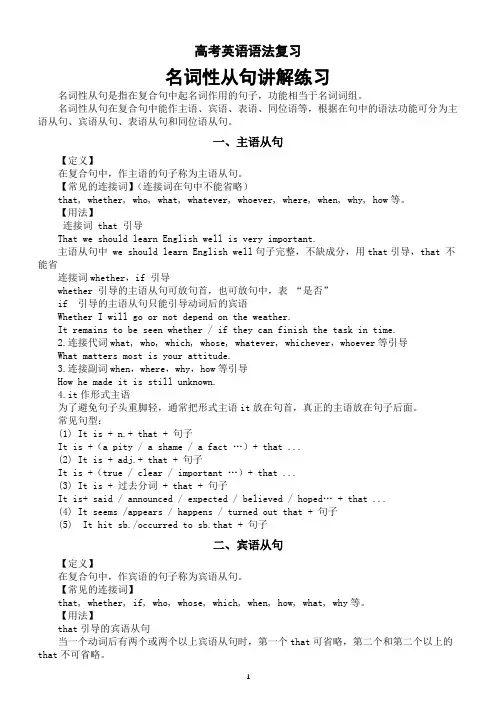
高考英语语法复习名词性从句讲解练习名词性从句是指在复合句中起名词作用的句子,功能相当于名词词组。
名词性从句在复合句中能作主语、宾语、表语、同位语等,根据在句中的语法功能可分为主语从句、宾语从句、表语从句和同位语从句。
一、主语从句【定义】在复合句中,作主语的句子称为主语从句。
【常见的连接词】(连接词在句中不能省略)that, whether, who, what, whatever, whoever, where, when, why, how等。
【用法】连接词 that 引导That we should learn English well is very important.主语从句中 we should learn English well句子完整,不缺成分,用that引导,that 不能省连接词whether,if 引导whether 引导的主语从句可放句首,也可放句中,表“是否”if 引导的主语从句只能引导动词后的宾语Whether I will go or not depend on the weather.It remains to be seen whether / if they can finish the task in time.2.连接代词what, who, which, whose, whatever, whichever,whoever等引导What matters most is your attitude.3.连接副词when,where,why,how等引导How he made it is still unknown.4.it作形式主语为了避免句子头重脚轻,通常把形式主语it放在句首,真正的主语放在句子后面。
常见句型:(1) It is + n.+ that + 句子It is +(a pity / a shame / a fact …)+ that ...(2) It is + adj.+ that + 句子It is +(true / clear / important …)+ that ...(3) It is + 过去分词 + that + 句子It is+ said / announced / expected / believed / hoped… + that ...(4) It seems /appears / happens / turned out that + 句子(5) It hit sb./occurred to sb.that + 句子二、宾语从句【定义】在复合句中,作宾语的句子称为宾语从句。
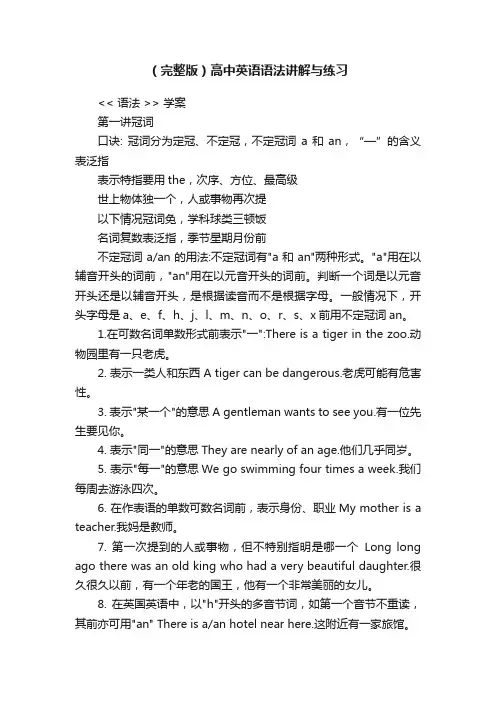
(完整版)高中英语语法讲解与练习<< 语法 >> 学案第一讲冠词口诀: 冠词分为定冠、不定冠,不定冠词a和an,“—”的含义表泛指表示特指要用the,次序、方位、最高级世上物体独一个,人或事物再次提以下情况冠词免,学科球类三顿饭名词复数表泛指,季节星期月份前不定冠词a/an的用法:不定冠词有"a和an"两种形式。
"a"用在以辅音开头的词前,"an"用在以元音开头的词前。
判断一个词是以元音开头还是以辅音开头,是根据读音而不是根据字母。
一般情况下,开头字母是a、e、f、h、j、l、m、n、o、r、s、x前用不定冠词an。
1.在可数名词单数形式前表示"一":There is a tiger in the zoo.动物园里有一只老虎。
2. 表示一类人和东西 A tiger can be dangerous.老虎可能有危害性。
3. 表示"某一个"的意思A gentleman wants to see you.有一位先生要见你。
4. 表示"同一"的意思They are nearly of an age.他们几乎同岁。
5. 表示"每一"的意思We go swimming four times a week.我们每周去游泳四次。
6. 在作表语的单数可数名词前,表示身份、职业My mother is a teacher.我妈是教师。
7. 第一次提到的人或事物,但不特别指明是哪一个Long long ago there was an old king who had a very beautiful daughter.很久很久以前,有一个年老的国王,他有一个非常美丽的女儿。
8. 在英国英语中,以"h"开头的多音节词,如第一个音节不重读,其前亦可用"an" There is a/an hotel near here.这附近有一家旅馆。
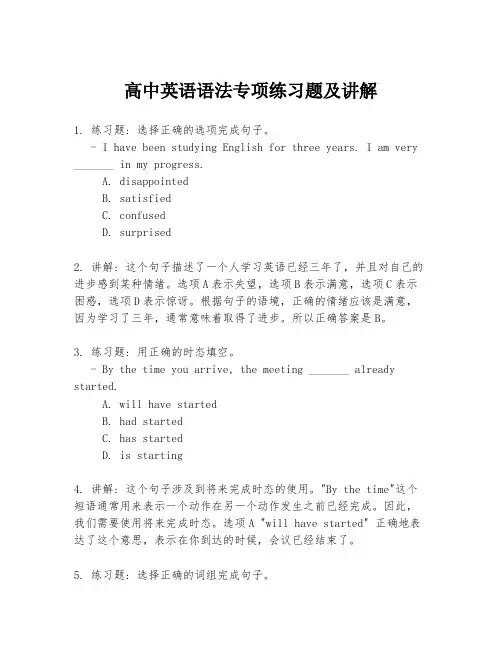
高中英语语法专项练习题及讲解1. 练习题: 选择正确的选项完成句子。
- I have been studying English for three years. I am very _______ in my progress.A. disappointedB. satisfiedC. confusedD. surprised2. 讲解: 这个句子描述了一个人学习英语已经三年了,并且对自己的进步感到某种情绪。
选项A表示失望,选项B表示满意,选项C表示困惑,选项D表示惊讶。
根据句子的语境,正确的情绪应该是满意,因为学习了三年,通常意味着取得了进步。
所以正确答案是B。
3. 练习题: 用正确的时态填空。
- By the time you arrive, the meeting _______ already started.A. will have startedB. had startedC. has startedD. is starting4. 讲解: 这个句子涉及到将来完成时态的使用。
"By the time"这个短语通常用来表示一个动作在另一个动作发生之前已经完成。
因此,我们需要使用将来完成时态。
选项A "will have started" 正确地表达了这个意思,表示在你到达的时候,会议已经结束了。
5. 练习题: 选择正确的词组完成句子。
- The teacher _______ the students to hand in their homework on time.A. expects ofB. expects fromC. expects toD. expects6. 讲解: 这个句子需要一个词组来表达老师对学生的期望。
选项A和B都包含了"expects",但是"of"和"from"在这里都不适用。

英语高中语法练习题及讲解English Grammar Exercises for High School StudentsExercise 1: Subject-Verb AgreementChoose the correct verb form to complete each sentence:1. The committee is/are responsible for the event planning.2. Neither the teacher nor the students is/are aware of the change in schedule.3. A number of books has/have been donated to the library.4. The number of students is/are increasing annually.Exercise 2: TensesFill in the blanks with the correct tense of the verb in parentheses:1. By the time we arrived, the party had alreadystarted/starts.2. She will be studying/studies at the university next year.3. I have not seen/had not seen him since he moved to Canada.4. If it rains/rained tomorrow, we will cancel the picnic.Exercise 3: PrepositionsSelect the appropriate preposition to complete the sentences:1. The cat climbed over/on the fence and into the neighbor's yard.2. She is interested in/at music and art.3. The book is lying on/at the table.4. They are waiting for/until the bus to arrive.Exercise 4: Adjectives and AdverbsDecide whether an adjective or an adverb is needed in each sentence:1. She sings beautifully/beautiful.2. The quick/quickly boy finished his race in record time.3. The boring/bore movie put everyone to sleep.4. He speaks English fluently/fluent.Exercise 5: Conditional SentencesRearrange the words to form correct conditional sentences:1. If / she / would pass / the exam / studied / hard.2. Unless / they / leave / early / will be / traffic / stuck in.3. Had he / known / the truth / he / would have / told you.4. Should you / succeed / if / you / work hard / you.Answers and Explanations:1. Exercise 1: The correct answers are "is", "is", "have", "is". Subject-verb agreement depends on the subject's proximity to the verb and whether it's singular or plural.2. Exercise 2: The correct answers are "had already started", "will be studying", "have not seen", "rains". Tenses are chosen based on the time frame of the action in relation tothe present, past, or future.3. Exercise 3: The correct answers are "over", "in", "on", "for". Prepositions are used to show the relationship between a noun or pronoun and other words in the sentence.4. Exercise 4: The correct answers are "beautifully", "quick", "boring", "fluently". Adjectives describe nouns, whileadverbs modify verbs, adjectives, or other adverbs.5. Exercise 5: The correct sentences are:- If she studied hard, she would pass the exam.- Unless they leave early, they will be stuck in traffic.- Had he known the truth, he would have told you.- If you work hard, you should succeed.These exercises are designed to test and improve your understanding of various English grammar concepts. Remember, practice is key to mastering grammar rules.。
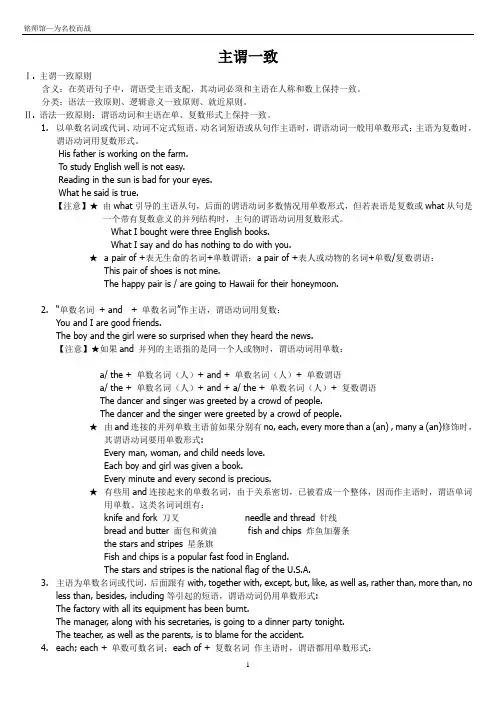
主谓一致Ⅰ. 主谓一致原则含义:在英语句子中,谓语受主语支配,其动词必须和主语在人称和数上保持一致。
分类:语法一致原则、逻辑意义一致原则、就近原则。
Ⅱ. 语法一致原则:谓语动词和主语在单、复数形式上保持一致。
1.以单数名词或代词、动词不定式短语、动名词短语或从句作主语时,谓语动词一般用单数形式;主语为复数时,谓语动词用复数形式。
His father is working on the farm.To study English well is not easy.Reading in the sun is bad for your eyes.What he said is true.【注意】★由what引导的主语从句,后面的谓语动词多数情况用单数形式,但若表语是复数或what从句是一个带有复数意义的并列结构时,主句的谓语动词用复数形式。
What I bought were three English books.What I say and do has nothing to do with you.★ a pair of +表无生命的名词+单数谓语;a pair of +表人或动物的名词+单数/复数谓语:This pair of shoes is not mine.The happy pair is / are going to Hawaii for their honeymoon.2.―单数名词+ and + 单数名词‖作主语,谓语动词用复数:You and I are good friends.The boy and the girl were so surprised when they heard the news.【注意】★如果and 并列的主语指的是同一个人或物时,谓语动词用单数:a/ the + 单数名词(人)+ and + 单数名词(人)+ 单数谓语a/ the + 单数名词(人)+ and + a/ the + 单数名词(人)+ 复数谓语The dancer and singer was greeted by a crowd of people.The dancer and the singer were greeted by a crowd of people.★由and连接的并列单数主语前如果分别有no, each, every more than a (an) , many a (an)修饰时,其谓语动词要用单数形式:Every man, woman, and child needs love.Each boy and girl was given a book.Every minute and every second is precious.★有些用and连接起来的单数名词,由于关系密切,已被看成一个整体,因而作主语时,谓语单词用单数。
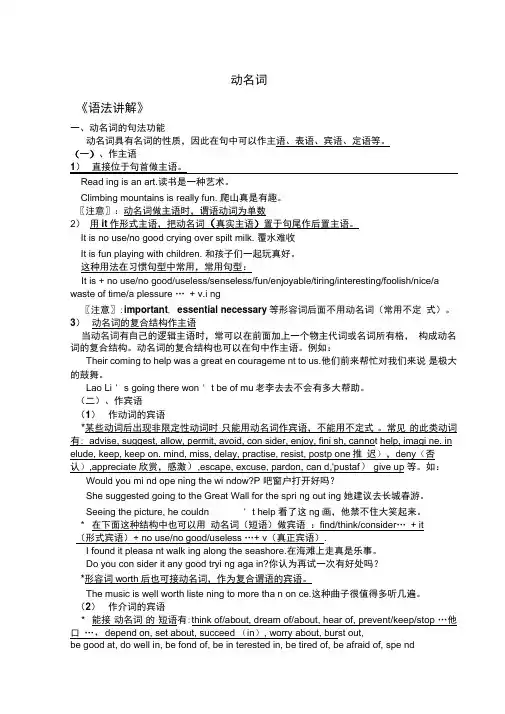
动名词《语法讲解》一、动名词的句法功能动名词具有名词的性质,因此在句中可以作主语、表语、宾语、定语等。
(一)、作主语1)直接位于句首做主语。
Read ing is an art.读书是一种艺术。
Climbing mountains is really fun. 爬山真是有趣。
〖注意〗:动名词做主语时,谓语动词为单数2)用it作形式主语,把动名词(真实主语)置于句尾作后置主语。
It is no use/no good crying over spilt milk. 覆水难收It is fun playing with children. 和孩子们一起玩真好。
这种用法在习惯句型中常用,常用句型:It is + no use/no good/useless/senseless/fun/enjoyable/tiring/interesting/foolish/nice/a waste of time/a plessure … + v.i ng〖注意〗:important, essential necessary等形容词后面不用动名词(常用不定式)。
3)动名词的复合结构作主语当动名词有自己的逻辑主语时,常可以在前面加上一个物主代词或名词所有格,构成动名词的复合结构。
动名词的复合结构也可以在句中作主语。
例如:Their coming to help was a great en courageme nt to us.他们前来帮忙对我们来说是极大的鼓舞。
Lao Li ' s going there won ' t be of mu老李去去不会有多大帮助。
(二)、作宾语(1)作动词的宾语*某些动词后出现非限定性动词时只能用动名词作宾语,不能用不定式。
常见的此类动词有: advise, suggest, allow, permit, avoid, con sider, enjoy, fini sh, cannot help, imagi ne. in elude, keep, keep on. mind, miss, delay, practise, resist, postp one推迟),deny(否认),appreciate 欣赏,感激),escape, excuse, pardon, can d,'pustaf) give up 等。
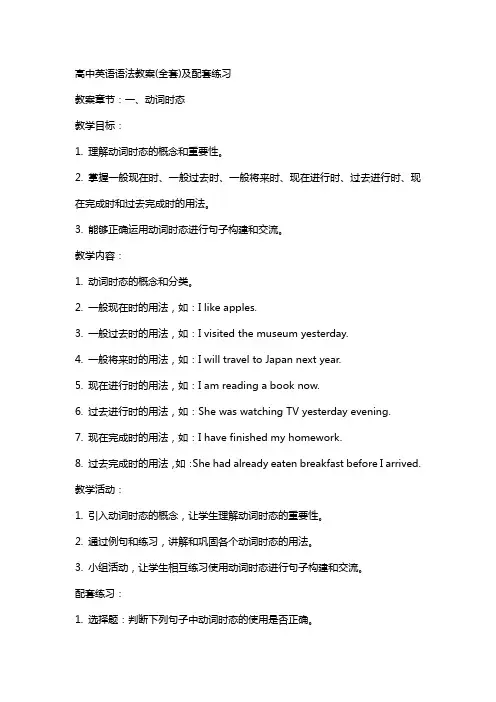
高中英语语法教案(全套)及配套练习教案章节:一、动词时态教学目标:1. 理解动词时态的概念和重要性。
2. 掌握一般现在时、一般过去时、一般将来时、现在进行时、过去进行时、现在完成时和过去完成时的用法。
3. 能够正确运用动词时态进行句子构建和交流。
教学内容:1. 动词时态的概念和分类。
2. 一般现在时的用法,如:I like apples.3. 一般过去时的用法,如:I visited the museum yesterday.4. 一般将来时的用法,如:I will travel to Japan next year.5. 现在进行时的用法,如:I am reading a book now.6. 过去进行时的用法,如:She was watching TV yesterday evening.7. 现在完成时的用法,如:I have finished my homework.8. 过去完成时的用法,如:She had already eaten breakfast before I arrived. 教学活动:1. 引入动词时态的概念,让学生理解动词时态的重要性。
2. 通过例句和练习,讲解和巩固各个动词时态的用法。
3. 小组活动,让学生相互练习使用动词时态进行句子构建和交流。
配套练习:1. 选择题:判断下列句子中动词时态的使用是否正确。
2. 填空题:根据语境,选择合适的动词时态填空。
3. 翻译题:将下列句子翻译成英文,注意使用正确的动词时态。
教案章节:二、名词和冠词教学目标:1. 理解名词的概念和重要性。
2. 掌握可数名词和不可数名词的用法。
3. 掌握定冠词和不定冠词的用法。
4. 能够正确运用名词和冠词进行句子构建和交流。
教学内容:1. 名词的概念和分类。
2. 可数名词和不可数名词的用法,如:apple (可数名词)和water (不可数名词)。
3. 定冠词和不定冠词的用法,如:The cat (定冠词)和a cat (不定冠词)。
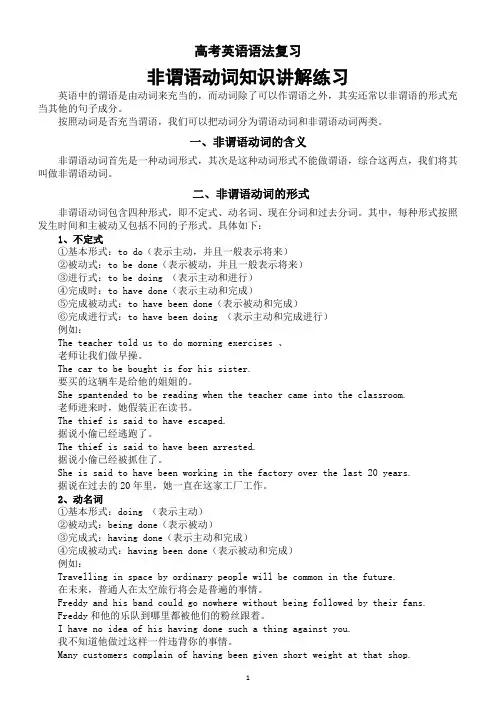
高考英语语法复习非谓语动词知识讲解练习英语中的谓语是由动词来充当的,而动词除了可以作谓语之外,其实还常以非谓语的形式充当其他的句子成分。
按照动词是否充当谓语,我们可以把动词分为谓语动词和非谓语动词两类。
一、非谓语动词的含义非谓语动词首先是一种动词形式,其次是这种动词形式不能做谓语,综合这两点,我们将其叫做非谓语动词。
二、非谓语动词的形式非谓语动词包含四种形式,即不定式、动名词、现在分词和过去分词。
其中,每种形式按照发生时间和主被动又包括不同的子形式。
具体如下:1、不定式①基本形式:to do(表示主动,并且一般表示将来)②被动式:to be done(表示被动,并且一般表示将来)③进行式:to be doing (表示主动和进行)④完成时:to have done(表示主动和完成)⑤完成被动式:to have been done(表示被动和完成)⑥完成进行式:to have been doing (表示主动和完成进行)例如:The teacher told us to do morning exercises 、老师让我们做早操。
The car to be bought is for his sister.要买的这辆车是给他的姐姐的。
She spantended to be reading when the teacher came into the classroom.老师进来时,她假装正在读书。
The thief is said to have escaped.据说小偷已经逃跑了。
The thief is said to have been arrested.据说小偷已经被抓住了。
She is said to have been working in the factory over the last 20 years.据说在过去的20年里,她一直在这家工厂工作。
2、动名词①基本形式:doing (表示主动)②被动式:being done(表示被动)③完成式:having done(表示主动和完成)④完成被动式:having been done(表示被动和完成)例如:Travelling in space by ordinary people will be common in the future.在未来,普通人在太空旅行将会是普遍的事情。
高中英语语法非谓语动词讲解及其练习题The document was prepared on January 2, 2021高中英语语法非谓语动词讲解及其练习题非谓语动词是一个较难学的,今天我给大家总结一下非谓语动词的使用和练习,希望大家能把非谓语动词学会非谓语动词是在句子中充当除谓语以外的句子成分的动词形式是动词的非谓语形式.动词一般在句子中充当谓语.在句中可起名词,形容词,副词的作用,在句中充当主语,宾语,表语,补语,定语或状语.即动词的非谓语形式除了不能独立作谓语外,可以承担句子的任何成分3种形式:不定式,分词现在分词、过去分词,动名词1.非谓语动词与谓语动词的相同点有:1如果是及物动词都可与宾语连用,例如:They built a garden.They suggested building a garden.2都可以被状语修饰:The suit fits him very well.The suit used to fit him very well.3都有主动与被动, “体”式一般式;进行式;完成式的变化.例如:He was punished by his parents.谓语动词被动语态He avoided being punished by his parents.动名词的被动式We have written the composition.谓语动词的完成时Having written the composition, we handed it in.现在分词的完成式4都可以有逻辑主语They started the work at once.谓语动词的逻辑主语The boss ordered them to start the work.动词不定式的逻辑主语We are League members.谓语动词的主语We being League member, the work was well done.现在分词的逻辑主语2、非谓语动词与谓语动词的不同点有:1非谓语动词可以有名词作用如动词不定式和动名词,在句中做主语、宾语、表语.2非谓语动词可以有形容词作用如动词不定式和分词,在句中做定语、表语或宾语补足语.3非谓语动词可以有副词作用如动词不定式和分词,在句中作状语.4谓语动词在句中作谓语,受主语的人称和数的限制;非谓语动词在句中不能单独作谓语,它不受主语的人称和数的限制.二非谓语动词的句法功能:二、非谓语动词用法:一动词不定式:to+do,具有名词、形容词、副词的特征.1.不定式的形式:以动词write为例否定式:not + to do1一般式:不定式的一般式所表示的动作与谓语动词动作同时发生或发生在谓语动词动作之后,例如:I'm glad to meet you.He seems to know a lot.We plan to pay a visit.He wants to be an artist.The patient asked to be operated on at once.The teacher ordered the work to be done.2进行式:不定式的进行式所表示的动作与谓语动词动作同时发生,例如:The boy pretended to be working hard.He seems to be reading in his room.3完成式:不定式的完成式表示的动作发生在谓语动词动作之前,例如:I regretted to have told a lie.I happened to have seen the film.He is pleased to have met his friend.2.不定式的句法功能:1作主语:To finish the work in ten minutes is very hard.To lose your heart means failure.动词不定式短语作主语时,常用it作形式主语,真正的主语不定式置于句后,例如上面两句可用如下形式:It is very hard to finish the work in ten minutes.It means failure to lose your heart.常用句式有:1、It+be+名词+to do.2、It takes sb.+some time+to do.3、It+be+形容词+of sb +to do.4、It+be+形容词+for sb.+to do.常用careless,,clever,good,foolish,honest,kind,lazy,nice,right,silly,stupid,wise,等表示赞扬或批评的形容词,不定式前的sb.可作其逻辑主语.2作表语:Her job is to clean the hall.He appears to have caught a cold.3作宾语:常与不定式做宾语连用的动词有:want, hope, wish, offer, fail, plan, learn, pretend, refuse, manage, help, agree, promise, prefer, 如果不定式宾语后面有宾语补足语,则用it作形式宾语,真正的宾语不定式后置,放在宾语补足语后面,例如:Marx found it important to study the situation in Russia.动词不定式也可充当介词宾语,如:I have no choice but to stay here.He did nothing last Sunday but repair his bike.动词不定式前有时可与疑问词连用,如:He gave us some advice on how to learn English.4作宾语补足语:在复合宾语中,动词不定式可充当宾语补足语,如下动词常跟这种复合宾语:want, wish, ask, tell, order, beg, permit, help, advise, persuade, allow, prepare, cause, force, call on, wait for, invite.此外,介词有时也与这种复合宾语连用,如:With a lot of work to do, he didn't go to the cinema.有些动词如make, let, see, watch, hear, feel, have等与不带有to的不定式连用,但改为被动语态时,不定式要加to, 如:I saw him cross the road.He was seen to cross the road.5作定语:动词不定式作定语,放在所修饰的名词或代词后.与所修饰名词有如下关系:①动宾关系:I have a meeting to attend.注意:不定式为不及物动词时,所修饰的名词如果是地点、工具等,应有必要的介词,如:He found a good house to live in.The child has nothing to worry about.What did you open it with如果不定式修饰time, place, way,可以省略介词:He has no place to live.This is the best way to work out this problem.如果不定式所修饰名词是不定式动作承受者,不定式可用主动式也可用被动式:Have you got anything to sendHave you got anything to be sent②说明所修饰名词的内容:We have made a plan to finish the work.③被修饰名词是不定式逻辑主语:He is the first to get here.6作状语:①表目的:He worked day and night to get the money.She sold her hair to buy the watch chain.注意不定式放句首时,逻辑主语与句子主语要一致:wrong:To save money, every means has been tried. right:To save money, he has tried every means. wrong:To learn English well, a dictionary is needed. right:To learn English well, he needs a dictionary.②表结果:He arrived late to find the train gone.常用only放在不定式前表示强调:I visited him only to find him out.③表原因:They were very sad to hear the news.④表程度:It's too dark for us to see anything.The question is simple for him to answer.7作独立成分:To tell you the truth, I don't like the way he talked.8不定式的省略:保留to省略do动词.If you don't want to do it, you don't need to.9不定式的并列:第二个不定式可省略to.He wished to study medicine and become a doctor.二动名词:动名词既具有动词的一些特征,又具有名词的句法功能.1.动名词的形式:否定式:not + 动名词1一般式:Seeing is believing. 眼见为实.2被动式:He came to the party without being invited.他未被邀请就来到了晚会. 3完成式:We remembered having seen the film. 我们记得看过这部电影.4完成被动式:He forgot having been taken to Guangzhou when he was five years old. 他忘记五岁时曾被带到广州去过.5否定式:not + 动名词I regret not following his advice. 我后悔没听他的劝告.6复合结构:物主代词或名词所有格+ 动名词He suggested our trying it once again. 他建议我们再试一次.His not knowing English troubled him a lot.他不懂英语给他带来许多麻烦.2.动名词的句法功能:1作主语:Reading aloud is very helpful. 朗读是很有好处的.Collecting stamps is interesting. 集邮很有趣.当动名词短语作主语时常用it作形式主语.It's no use quarrelling.争吵是没用的.2作表语:In the ant city, the queen's job is laying eggs.在蚂蚁王国,蚁后的工作是产卵.3作宾语:They haven't finished building the dam. 他们还没有建好大坝.We have to prevent the air from being polluted.我们必须阻止空气被污染.注意动名词既可作动词宾语也可作介词宾语,如上面两个例句.此外,动名词作宾语时,若跟有宾语补足语,则常用形式宾语it,例如:We found it no good making fun of others. 我们发现取笑他人不好.要记住如下动词及短语只跟动名词作宾语:enjoy, finish, suggest, avoid避免, excuse ,delay, imagine, keep, miss, consider, admit承认,deny否认, mind, permit, forbid, practise, risk冒险, appreciate感激, be busy, be worth, feel like, can't stand, can't help情不自禁地, think of, dream of, be fond of, prevent…from,keep …from, stop…from,protect…from, set about, be engaged in, spend…in, succeed in, be used to, look forward to, object to, pay attention to, insist on, feel like4作定语:He can't walk without a walking-stick. 他没有拐杖不能走路.Is there a swimming pool in your school 你们学校有游泳池吗5作同位语:The cave, his hiding-place is secret. 那个山洞,他藏身的地方很秘密.His habit, listening to the news on the radio remains unchanged.他收听收音机新闻节目的习惯仍未改变.三现在分词:现在分词既具有动词的一些特征,又具有形容词和副词的句法功能.1、现在分词的形式:否定式:not + 现在分词1现在分词的主动语态:现在分词主动语态的一般式表示与谓语动词所表示的动作同时发生,完成式表示的动作在谓语动词所表示的动作之前发生,常作状语.例如:They went to the park, singing and talking. 他们边唱边说向公园走去.Having done his homework, he played basket-ball. 做完作业,他开始打篮球.2现在分词的被动语态:一般式表示与谓语动词同时发生的被动的动作,完成式表示发生在谓语动词之前的被动的动作.The problem being discussed is very important. 正在被讨论的问题很重要.Having been told many times, the naughty boy made the same mistake.被告诉了好几遍,这个淘气的孩子又犯了同一个错误.2.现在分词的句法功能:1作定语:现在分词作定语,当分词单独做定语时,放在所修饰的名词前;如果是分词短语做定语放在名词后.In the following years he worked even harder.在后来的几年中,他学习更努力了.The man speaking to the teacher is our monitor's father.正与老师谈话的那个人是我们班长的父亲.现在分词作定语相当于一个定语从句的句法功能,如:in the following years 也可用in the years that followed; the man speaking to the teacher可改为the man who is speaking to the teacher.2现在分词作表语:The film being shown in the cinema is exciting. 正在这家上演的电影很棒.The present situation is inspiring. 当前的形势鼓舞人心.be + doing既可能表示现在进行时,也可能是现在分词做表语,它们的区别在于be + doing表示进行的动作是进行时,而表示特征时是系动词be与现在分词构成系表结构.3作宾语补足语:如下动词后可跟现在分词作宾语补足语:see, watch, hear, feel, find, get, keep, notice, observe, listen to, look at, leave, catch等.例如:Can you hear her singing the song in the next room 你能听见她在隔壁唱歌吗He kept the car waiting at the gate. 他让小汽车在门口等着.4现在分词作状语:①作时间状语:While Working in the factory, he was an advanced worker.在工厂工作时,他是一名先进工人.②作原因状语:Being a League member, he is always helping others. 由于是共青团员,他经常帮助他人.③作方式状语,表示伴随:He stayed at home, cleaning and washing. 他呆在家里,又擦又洗.④作条件状语:If Playing all day, you will waste your valuable time.要是整天玩,你就会浪费宝贵的时间.⑤作结果状语:He dropped the glass, breaking it into pieces. 他把杯子掉了,结果摔得粉碎.⑥作目的状语:He went swimming the other day. 几天前他去游泳了.⑦作让步状语:Though raining heavily, it cleared up very soon.虽然雨下得很大,但不久天就晴了.⑧与逻辑主语构成独立主格:I waiting for the bus, a bird fell on my head.我等汽车时,一只鸟落到我头上.All the tickets having been sold out, they went away disappointedly.所有的票已经卖光了,他们失望地离开了.Time permitting, we'll do another two exercises.如果时间允许,我们将做另两个练习.有时也可用with without +名词代词宾格+分词形式With the lights burning, he fell asleep. 他点着灯睡着了.⑨作独立成分:udging fromby his appearance, he must be an actor.从外表看,他一定是个演员.Generally speaking, girls are more careful. 一般说来,女孩子更细心.四过去分词:过去分词只有一种形式:规则动词由动词原形加词尾-ed构成.不规则动词的过去分词没有统一的规则要求,要一一记住.过去分词的句法功能:1.过去分词作定语:Our class went on an organized trip last Monday. 上周一我们班开展了一次有组织的旅行.Those elected as committee members will attend the meeting. 当选为委员的人将出席这次会.注意当过去分词是单词时,一般用于名词前,如果是过去分词短语,就放在名词的后面.过去分词做定语相当于一个被动语态的定语从句.2.过去分词作表语:The window is broken. 窗户破了.They were frightened at the sad sight. 他们对眼前悲惨的景象感到很害怕.注意:be + 过去分词,如果表示状态是系表结构,如果表示被动的动作是被动语态.区别:The window is broken.系表The window was broken by the boy.被动有些过去分词是不及物动词构成的,不表示被动,只表示完成.如:boiled water开水 fallen leaves落叶newly arrived goods新到的货 the risen sun升起的太阳the changed world变了的世界这类过去分词有:gone, come, fallen, risen, changed, arrived, returned, passed 等.3.过去分词作宾语补足语:I heard the song sung several times last week.上周我听见这首歌被唱了好几次.有时过去分词做with短语中的宾语补足语:With the work done, they went out to play. 工作做完了,他们出去玩去了.4.过去分词作状语:Praised by the neighbours, he became the pride of his parents.受到邻居们的表扬,他成为父母的骄傲.表示原因Once seen, it can never be forgotten.一旦它被看见,人们就忘不了.表示时间Given more time, I'll be able to do it better.如果给予更多的时间,我能做得更好.表示条件Though told of the danger, he still risked his life to save the boy.虽然被告之有危险,他仍然冒生命危险去救那个孩子.表示让步Filled with hopes and fears, he entered the cave. 心中充满了希望与恐惧,他走进山洞.非谓语动词考点分析1.The Olympic Games, ______ in 776 ,did’t include women players until 1919.playing be first played played be first playing析:根据题干,必须选表示被动的选项,故排除A、D;因B选项表“将要被举行”意,不合题干之用,只有C选项相当于which was first played才合用.2.European football is played in 80 countries, ______ it the most popular sportin the world.make析:B、C是谓语动词,在此不可用.D项to make或表目的,或表“将要使得”,这都不合题干情景.只有,可作状语,表结果.再举一现在分词作结果状语例:The bus was held up by the snowstorm,causing the delay.公共汽车被大风雪所阻,因而耽误了.3.Little Jim should love ______ to the theatre this evening.be taken take taken析:根据this evening,应选表示将来义的选项,C、D应排除.Take后无宾语,必然要用被动式,故答案为A.4.John was made ______ the truck for a week as a punishment.wash be washing析:根据be made to do sth.句式,可定答案为A.5.The patient was warned ______ oily food after the operation.eat not not to eat eating析:根据warn sb.notto do sth.句式,可排除B、D两项;又根据非谓语动词的否定式not总是在首位的规律,又可排除A,而定C.6.——I usually go there by train. ——Why not ______ by boat for a change try going to go try and go going析:此题可根据why not后直接跟原形动词规律而一举确定正确答案为D.若将B项改为try to go,则要根据其与try going意义之别来确定答案.依据题干对话内容,乙方是建议甲方尝试乘船变变花样,所以答案仍为D.7.______ a reply,he decided to write again.receiving not having received not received析:非谓语动词的否定式not应置于首位,B、D皆为错误形式.A项不能表达先于decided的动作,只有选C项才表没收到信在先,决定再写信在后,所以C为正确答案.8.Charles Babbage is generally considered ______ the first computer.invent have invented mvented析:consider表“考虑”意时,其后动词用doing形式,此处不表“考虑”,而表“认为”,这时consider后作宾语补足语或主语补足语多为to do,to have done,to be等形式.据此可排除B、D两个选项.又因A表“要发明”意,不合题用,只有C表“发明了”意,才合题用,故选C.9.Most of the artists ______ to the party were from South Africa.invite invited been invited析:“被邀请参加晚会”,应选表被动意的选项,B不可用.D项少引导词who,也应排除.又因短暂动词的现在分词被动式不可作定语,C也应排除,只有=who were invited才是正确答案.10.The murderer was brought in,with his hands ______ behind his back.tied tied be tired析:B表主动意,应排除.C表“将要被捆绑”,A表“正在被捆绑”都不合题意,只有D项填入空白才能表达“双手被反绑着”这一意思,符合题干情景.再看一类似例句: He came in,withhis head held high.他昂首走了进来.非谓语动词专练more attention,the trees could have grown better.give givenfirst textbooks ______ for teaching English as a foreign language came out in the 16th century.be written written writtenmissing boys were last seen ______ near the river.play be playingin thought,he almost ran into the car in front of him.lose lostpassing me he pretended ______ me.see having seen have not seen to have seenchildren insisted ______ there on foot.going would go their goingstill remembers ______ to Shanghai when he was very young.taken takenthe railway station,we had a break,only ______ the train had left.at;to find to;discovering thatarriving at;finding out to;to have found outthe boy ______ the way,we had no trouble ______ the way ______ to Zhongshan Park.;finding;leading lead;found;to lead ;finding;led ;found;ledthese pictures,I couldn’t help thinking of those days when I was in Being and______ from the top of a thirty-storeyed building,Beijing looks more beautiful.;seen ;seeing ;seeing ;seencan hardly imagine Peter ______ across the Atlantic Ocean in five days.have sailed sailyou wave your book in front of your face,you can feel the air ______ against your face.moveis known to all,China will be an ______ and powerful country in 20 or 30 years’ time.;advancing ;advanced ;advanced ;advancingshopping,people sometimes can’t help ______ into buying something they don’t really need.persuaded persuadedwas terrible noise ______ the sudden burst of light.be followed followedexcuse my ______ in without ______ .;permitted ;permitted ;being permitted come;being permittedhis head high,the manager walked into the room to attend the meeting ______ then.;being held ;holding held;held ;to be held18.——Did you hear her ______ this pop song this time the other day——Yes,and I heard this song ______ in English.;singing ;sung ;singing ;sungquestion ______ now at the meeting is not the question ______ yesterday.;discussed ;had discussed discussed;discussed ;discussingthe cooking ______ ,I went on ______ some sewing.;to do done;doing be done;doing have done;doingis no use ______ your past mistakes.A. regrettingB. regretC. to regretD. regrettedhusband died in 1980 and had nothing ______ to her,only ______ her five children.;to leave ;leaving ;left ;leavingam very have a very difficult problem ______ .work work out be worked out work it outwould appreciate ______ back this affernoon.to call call calling ’re callingmountains was ______ ,so we all felt ______ .;tired ;tiring ;tiring ;tiredsaw some villagers ______ on the bench at the end of the room.themselveswas glad to see her child well ______ care of.be takenis one of the important problems ______ tomorrow.solve be solvedmaps properly,you need a special pen.draw drawingis a river ______ around our school.run be runningabout the two of us ______ a walk down the gardentake be takenwas fortunate to pick up a wallet ______ on the ground on the way back home, but unfortunately for me,I found my colour TV set. ______ when I got home.;stolen ;stealing ;stolen ;stealingthe kind-hearted boy ____ me with my work,I’m sure I’ll be able to spare time___ with your work.help;help you out ;helping you ;to help you out help;to help youmovedd by her words, ______ .came to his eyes B .he could hardly hold back his tearsC. tears could hardly be held backD. his eyes were filled with tears.35.——I hope the children won’t touch the dog.——I’ve warned them ______ .to touch dowould love ______ to the party last night but I had to work extra hours to finish a report.go have gone gone______ why he walked in without permission,he just stared at us and said nothing.asked be askedman kept silent in the room unless ______ .to to speakwas often listened ______ in the next room.sing to singthan ______ on a crowded bus,he always prefers ______ a bicycle.;ride ;ride ;to ride ride;ridingboy wanted to ride his bicycle in the street,but his mother told him ______ .to to do do it not to’s troubling them is ______ enough experienced workers.they have to have not not having their havinghis telephone number,she had some difficulty getting in touch with Bill.knowing not having known not knowis used ______ houses in some places .build building be built builton ______ the other exercise after you have finished this one.do be doingday we looked forward to ______ .come comewould you rather ______ the workhave to do have do to do doyou think it any good ______ with him againtalk talking talkednew ideas have to be tested many times before ______ .fully fully accepted accepting being acceptedgovernment forbids ______ such bad books.publish非谓语动词专练答案1―5 C B D B D 6―10 C B A A A 11―15 C B C C B 16―20 C A D C A21―25 A D B C A 26―30 C C B C C 31―35 C A D B B 36―40 B B A D C 41―45 A C A A A 46―50 C D A B D非谓语动词非谓语动词是指分词包括现在分词和过去分词、不定式、动名词等三种形式,即:doing , done , to do , doing .当然它们有各自不同的变化形式,如:现在分词 doing : 有being done被动式 ; having done 完成式; having been do ne 完成被动式不定式 to do : 有to be done 被动式; to have done 完成式; to be doing进行式动名词 doing : 有having done完成式; being done被动式 ;非谓语动词的特点:三种非谓语动词都具有动词的特征,虽然它们没有人称和数的变化,但是它们都能带自己的状语或有时跟宾语.它们都有各自的特征:分词具有形容词和副词的特征;动名词具有名词的特征;不定式具有名词、形容词和副词的特征.具体来讲:分词在句子中可以做定语、表语、状语或补足语等;动名词在句子中可以做主语、宾语、表语等;不定式在句子中可以做主语、宾语、表语、补足语或状语.下面分别对三种非谓语动词进行讲解:一.动词不定式先看几个例句,判断不定式在句中的成分.1.To learn a foreign language is difficult .2. His wish is to be a driver .3.Tom wanted to have a cup of beer .4.The teacher told us to do morning exercises .5.I have nothing to say .6.They went to see their aunt .7.It’s easy to see their aunt.8.I don’t know what to do next .9.I heard them make a noise .说明:1.动词不定式作主语, 2.动词不定式作表语,3.动词不定式作宾语,4.动词不定式作宾语补足语,5.动词不定式作定语,6.动词不定式作目的状语,7.动词不定式作真正主语,it 代替动词不定式,作形式主语.8.带有连接代词的动词不定式作宾语,9.不带to 的动词不定式作宾语补足语.掌握动词不定式应注意的几个问题:1.“to” 是不定式符号还是介词,下列短语中的to 都是介词.agree to object to close to , come to , lead to , refer to ,equal to , familiar to , point to , thank to , devote to , next to , belong to , be used to , look forward to2.带to 还是不带toI have no choice but to give inI cannot do anything but give inI saw him enter the classroom .但是: He was seen to enter the classroom .3.动词不定式逻辑主语是由for 作为标记的.但是有时用of .It’s necessary for you to study hard .It’s foolish of him to do it .与of 连用的形容词有:good, kind , nice , wise ,clever , foolish , right , wrong , careful , careless , polite , possible4.后接不定式作宾语的动词有:want , hope , wish , like , begin , try , need , forget , agree , know , promise , teach , refuse , help , arrange , dare , decide , determine , fail , manage , offer , prepare , continue , ask , mean , choose , expect etc.需要宾语补足语的动词不能用动词不定式直接做介词的宾语,而要用it做形式宾语.例如:通常不说We think to obey the laws is important . 而说We think it important to obey the laws .5.不定式的省略.下列短语中,如果意义明确,常常省略到to .want to , wish to ,hope to , like to , hate to , plan to , try to , love to , have to , o ught to , need to , used to , be able to6.不定式作定语,应注意两种关系:1动宾关系:He has a lot of meeting to attend .Please lend me something to write with .He is looking for a room to liveHe is looking for a room to live in .He has no money and no placeto live in .I think the best way to travel by is on foot .There is no time to think about .2主谓关系:She is always the last person to speak at the meeting .----I’m going to the post office , for I have a l etter to post . 逻辑主语是I-------Thank you. But I have no letters to be posted now 逻辑主语不是I7.不定式作状语,可以有以下几种意义:1 原因He is lucky to get here on time .这种结构中常用的形容词有:happy , glad , delighted , pleased , sorry , eager , anxious . lucky , fortunate , proud , angry surprised , frightened , disappointed , ready , clever , foolish , worthy2 目的He came to help me with my maths .3 结果I hurried to get there only to find him out .The book is too hard for the boy to read .He is old enough to go to school .8 . 不定式作补足语I saw him play in the street just now .能跟不带to 的不定式作补足语的动词有:see , feel , hear , listen to , look at , watch , let , have make, observe, notice 注: 当这些词为被动式时,不定式要带to , 如:He was seen to play in the street just now.二.动名词Learning English is very difficult .学英语非常困难.His job is driving a bus .他的工作是开车.I enjoy dancing .我喜欢跳舞.I have got used to living in the country .我已经习惯了住农村.Take some sleeping tablets , and you will soon fall asleep .吃点安眠药,你很快就会入睡.注意以下几种结构:1.There’s no telling what will happen .=It’s impossible to tell what will happen .= No one can tell what will happen .2.It’s no use talking with him .It’s no good speaking to them like that .3.There’s some difficulty in doing …在此句型中,difficulty 可以由以下单词替换:trouble , problem , fun , pleasure , a good time , a hard time 注意以下几个问题:1.下列动词后跟不定式与跟动名词作宾语意义有区别, forget to do … 忘记要做某事forget doing… 忘记做了某事remember to do…记住要做某事remember doing …记着做了某事mean to do … 有意要做某事mean doing … 意味着做了某事regret to do … 对要做的事表示后悔regret doing … 对做过去的事后悔can’t help to do…不能帮助做某事can’t help doing … 情不自禁做某事try to do … 尽力去做某事try doing 试着做某事learn to do … 学着去做某事learn doing … 学会做某事stop to do … 停下来去做另一件事stop doing … 停止做某事go on to do … 接着做另外一件事go on doing … 继续做某事used to do … 过去做某事be used to doing … 习惯做某事2.动名词作定语与现在分词作定语意义有区别动名词作定语表达 n+ for doing 的含义现在分词作定语表达 n+whichwho be doing的含义如:a sleeping car = a car for sleepinga running horse = a horse which is running前者是动名词 , 后者是现在分词又如: drinking water , walking stick running water , sleeping boy3.动名词的逻辑主语:动名词的逻辑主语为代词或名词的所有格形式.例如:His coming made us very happy .4.动名词的语态和时态5.动名词主动形式表被动的情况:need doing , want doing , require doing例如: This room needs painting . 这个房间需要粉刷.6.只能跟动名词作宾语的动词:admit , avoid , advise , consider , delay , deny , enjoy , escape , excuse , fancy , finish , complete , forbid , imagine , mind , miss , permit . practise , require , suggest ,risk , keep, take to , look forward to , get down to , feel like , can’t help , can’t stand , be used to ,insist on , succeed in , set about, give up , include ,三.分词1 The story is interesting . I’m interested in it .这个故事有兴趣,我对这个故事感兴趣.2 . This is a moving film .这是一部动人的电影.3. The secretary worked late into the night , preparing a long speech for the president .秘书工作到深夜,为主席准备一篇长篇演讲稿.4. Given more tim e , I’ll do it well .如果给我多一点时间,我会做的更好.When he passed the back of the street , he saw the thief stealing some money from the bank .当他后街时,看到小偷正从银行偷钱.应注意的几个问题:1.现在分词与过去分词的区别Do you know the woman talking to Tom= Do you know the woman who is talking to TomThe soldier wounded in the war has become a doctor.= The soldier who was wounded in the war has become a doctor.China is a developing country and America is a developed country.2.分词作表语The news sounds encouraging .They got very excited .1现在分词与过去分词作表语的区别:The news is interesting .He is interested in the news .doing 作表语,主语与表语是主谓关系;done 作表语,主语与表语是动宾关系.2表语与被动式的区别:The blackboard was broken by Xiao Ming .强调动作。
高考英语语法复习定语从句知识讲解练习1.定语从句定义定语从句是用来修饰名词或代词的从句。
可分为限定性定语从句和非限定性定语从句。
1.限制性定语从句:对先行词起限定修饰作用He is a man who likes travelling and reading.和主句关系密切,不用逗号隔开,去掉主句,句子不完整。
2. 非限制性定语从句:对先行词起修饰作用(先行词与定语从句之间用逗号隔开)The house, which I bought last year, has a beautiful garden.也可以对主句起修饰作用He was late again, which made his teacher angry.和主句关系不密切,用逗号分开,去掉主句,句子完整。
2.先行词先行词是被定语从句修饰的成分。
先行词可以是名词、代词或整个主句。
先行词是指人时,可用that, who, whom, whoseThis is the person ( who/whom/that ) you want to see.先行词是指物时,可用which, that, whoseI like to live in a room that / which has a window facing south.3.关系词关系词:关系代词和关系副词两种关系代词:that, which, who, whom, whose, as在从句中作主语,宾语,表语,定语先行词是指人时,可用关系代词:that, who, whom, whoseThis is the person ( who/whom/that ) you want to see.先行词是指物时,可用关系代词:which, that, whoseI like to live in a room that / which has a window facing south.I like to live in a room whose window faces south.=I like to live in a room of which the window faces south.=I like to live in a room the window of which faces south.关系副词:when, where, why 在从句中作状语先行词是表示时间的名词时,可用when, in which, on which等;I never forget the day when / on which I came to this school.先行词是表示地点的名词时,可用where, in which, at which等;The factory where / in which his father works is far from here.This is the factory where /in which he works.如果定语从句修饰point,situation,part,condition和case等表示抽象意义的词,常用where 引导We have reached a point where a change is needed.区分:there’s one point that we must insist on.先行词是表示原因的名词时,可用why, for which等。
高中英语语法讲解及练习一、冠词冠词的用法在英语学习中较为复杂,千头万绪,尤其是惯用法,请同学们平时学习时注意积累。
以下不过是谈谈冠词的一些常规的用法。
一、不定冠词的用法:1、泛指人或事物的类别,相当于any, 如:A hammer is tool. A steel worker makes steel.2、泛指某人或某物。
A boy is waiting for you. There is a book on your desk.3、表one或every。
We work 8 hours a day. I go home twice a month.4、表示the same 的意思。
Birds of a (= the same) feather flock together; people of a kind come together.5、用在不可数名词前a)(用在物质名词前)一种,一份A large coffee for me. It was a wonderful tea.b)(用在某些表示风、雨等的名词前)It was clear daylight now and a fine rain was falling. There is a cold wind this morning.c)(用在抽象名词前)一种That is a great disappointment. It’s a pleasure to work with you.6、(用在某些专有名词前)某个叫…的人,一张…的画,一个象…的人等。
I saw a Mrs. Smith on the 12th at 2:00. He had a Van Gogh in thedining-room.What a strange London they saw! He’s a living Lei Feng.7、用于某些固定词组中。
a few, a little, a good many, a lot of, all of a sudden, as a rule, have a cold等。
高考英语语法考点讲解与练习一、非谓语动词作定语【知识要点】1、非谓语动词包括四种:-to do不定式,-ing分词,-ed分词和动名词。
(重点为前三种)2、非谓语动词的词性及句法功能①-to do不定式相当于名词、形容词和副词,可以在句子中充当主语、宾语、表语、定语、状语和宾语补足语;②-ing分词相当于形容词和副词,可以在句子中充当表语、定语、状语和宾语补足语;③-ed分词相当于形容词和副词,可以在句子中充当表语、定语、状语和宾语补足语;④动名词相当于名词,可以在句子中充当主语、宾语、表语和定语。
3、前三种非谓语动词的形式与意义① -ing分词的基本意义为:主动或进行,变形有:进行式:doing被动式:being done完成式:having done完成被动式:having been done②-to do不定式的基本意义为:主动将来,变形有:进行式:to be doing被动式:to be done完成式:to have done完成被动式:to have been done③-ed分词表示被动或完成。
4、非谓语动词作定语由于三种非谓语动词都具有形容词的性质,所以它们都可以在句子中充当定语,并根据其在被修饰的名词中心词的前后位置,分为前置定语和后置定语两种。
the falling leaves (-ing分词作前置定语,“正在下落的叶子”)the leaves falling in the sky (-ing分词短语作后置定语,“正在空中下落的叶子”)the coming/following day (-ing分词作前置定语,“第二天”)the day to come (-to do分词短语作后置定语,“第二天”)the fallen leaves (-ed分词作前置定语,“已经落地的叶子/落叶”)the house burnt to the ground (-ed分词短语作后置定语,“被烧成废墟的房子”)【练习】单句语法填空1.Looking at the ______ (fall) leaves in the sky, he knows the fall is coming.2.Seeing the ______ (fall) leaves on the ground, he decided to do some sweeping first before sitting down to have a rest.3.It is said that the building ______ (build) here next year will be completed within one year.4.It is said that the building ______ (build) here now will be completed within one year.5.It is said that the building ______ (build) here last year will be rebuilt soon.6.The gentleman ______ (seat) next to Tom is his best friend.7.The gentleman ______ (sit) next to Tom is his best friend.8.The room was in a mass, with those ______ (break) furniture.9.The purely white snow looks like a beautiful blanket ______ (cover) the land.10.The police have got enough evidence ______ (prove) that he is guilty.11.Turn to the right and you will see a wide road ______ (lead) up to the building.12.If you get the first place, you will win an all expenses ______ (pay) journey.13.All the ______ (question) people supported the government’s latest policy.14.You should keep well the books ______ (borrow) from the library.15.Can those people ______ (seat) at the back hear me?二、非谓语动词作状语【知识要点】非谓语动词作状语由于三种非谓语动词都具有副词的性质,所以它们都可以在句子中充当状语。
高中语法基础练习题及讲解### 高中语法基础练习题及讲解#### 练习题一:冠词的使用题目:1. There is ________ "s" in the word "island."2. ________ Great Wall is a famous landmark in China.答案:1. an2. The讲解:冠词分为不定冠词 "a" 和 "an",以及定冠词 "the"。
"a" 用于辅音音素开头的单词前,而 "an" 用于元音音素开头的单词前。
"the" 用于特指某个人或物。
在第一个句子中,"s" 发音为 [es],以元音音素开头,因此使用 "an"。
第二个句子中,"Great Wall" 是特指中国的长城,所以使用定冠词 "the"。
#### 练习题二:时态的使用题目:1. I ________ (finish) my homework when the phone rang.2. By the time you ________ (arrive), the meeting ________ (start).答案:1. had finished2. arrive; will have started讲解:时态表示动作发生的时间。
在第一个句子中,"when" 引导的时间状语从句使用了过去时 "rang",因此主句的动作发生在从句动作之前,使用过去完成时 "had finished"。
第二个句子中,"By the time" 表示到某个时间点为止,主句使用将来时态 "will have started",从句则使用一般现在时 "arrive" 来表示将来的动作。
非谓语动词一、语法概念巧掌握:(一)非谓语动词重点概念及区分1.考查不定式、现在分词与过去分词的基本区别从时间关系上看,不定式表未来,现在分词表进行,过去分词表完成;同时注意不定式和现在分词的完成式也表完成;从主动与被动来看,不定式和现在分词表示主动,过去分词表被动;同时注意不定式和现在分词的被动式也表被动(不定式的被动式在表被动的同时还表未来,现在分词的被动式表被动的同时还兼表进行)例:I send you 100 dollars today, the rest ______ in a year.A.followB.followedC.to followD.being followed________from other continents for millions of years, Australia has many plants and animals not found in any other country in the world.A.Being separartedB.Having separatedC.Having been separatedD.to be separated2.考查非谓语动词的主动式与被动式结合句子意思,考查非谓语动词与相应逻辑主语的关系,若为主动关系,用主动式;若为被动关系,用被动式。
此时要特别注意,过去分词没有相应的被动式,因为它本身可以表示被动。
1.The repairs cost a lot, but it’s money well _________.A.to spendB.spentC.being spentD.spending2.The prize of the game show is $3000 and an all expenses ______vacation to China.A.payingB.paidC.to be paidD.being paid3.When ______help, one often says, “Thank you.” or It’s kind of you.A.offeringB.to offerC.to be offeredD.offered考查非谓语动词完成式的用法非谓语动词的完成式主要表示发生在谓语动作之前的动作。